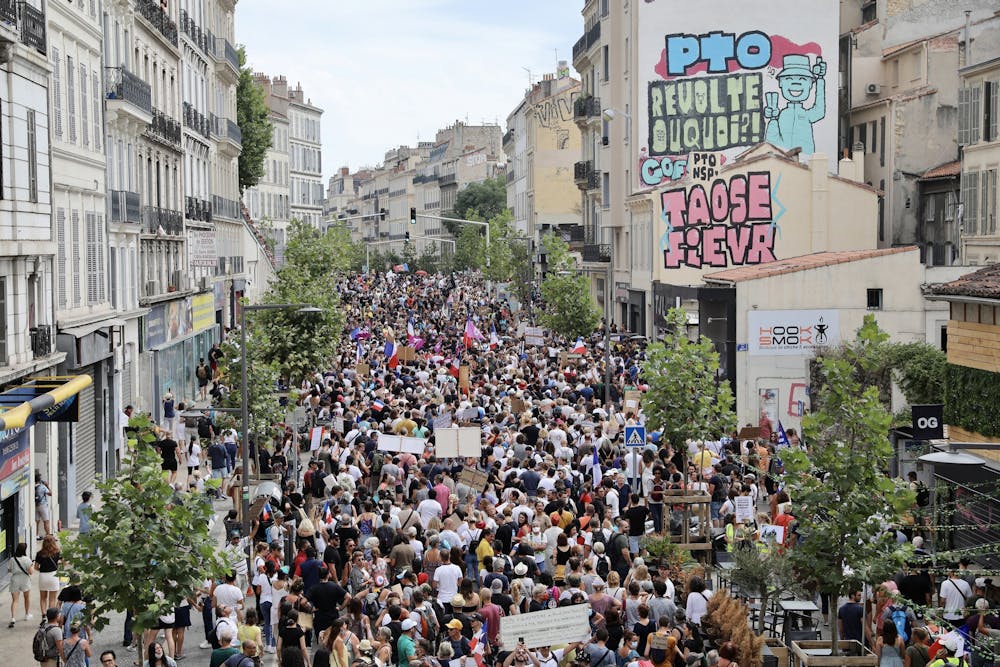Editor’s Note: This listicle is part of a series by The Ball State Daily News summarizing five stories from around the world. All summaries are based on stories published by The Associated Press.
The Taliban take another Afghan provincial capital, UN says global warming nears limits, massive forest fire in Greece still burning for the seventh day, Nagasaki marks 76th anniversary of atomic bombing and France's new virus pass is required in restaurants and on trains makes up this week's five international stories.
Taliban press on, take another Afghan provincial capital
The Taliban on Monday took control of another provincial capital in Afghanistan, an official said. The city’s fall was the latest in a weekslong, relentless Taliban offensive as American and NATO forces finalize their pullout from the war-torn country. The militants have ramped up their push across much of Afghanistan, turning their guns on provincial capitals after taking large swaths of land in the mostly rural countryside. At the same time, they have been waging an assassination campaign targeting senior government officials in the capital, Kabul. The sweep comes despite condemnations by the international community and warnings from the United Nations that a military victory and takeover by the Taliban would not be recognized.
'Nowhere to run': UN report says global warming nears limits
Earth is getting so hot that temperatures in about a decade will probably blow past a level of warming that world leaders have sought to prevent, according to a report released Monday that the United Nations called a “code red for humanity.” But scientists also eased back a bit on the likelihood of the absolute worst climate catastrophes. The authoritative Intergovernmental Panel on Climate Change (IPCC) report, which calls climate change clearly human-caused and “unequivocal,” makes more precise and warmer forecasts for the 21st century than it did last time it was issued in 2013. Each of five scenarios for the future, based on how much carbon emissions are cut, passes the more stringent of two thresholds set in the 2015 Paris climate agreement.
Massive forest fire in Greece still burning for 7th day
Firefighters and residents battled a massive forest fire on Greece’s second largest island for a seventh day Monday, fighting to save what they can from flames that have decimated vast tracts of pristine forest, destroyed homes and businesses and sent thousands fleeing. The smoke and ash from the fire on Evia, a rugged island of forests and coves almost touching the Greek mainland, blocked out the sun, turning the sky orange as the blaze rampaged across the northern part of the island. The fire, which began Aug. 3, is the most severe of dozens that have broken out across Greece in the past week, after the country was baked by its worst heat wave in three decades which sent temperatures soaring to 45 degrees Celsius (113 Fahrenheit) for days.
Nagasaki marks 76th anniversary of atomic bombing
Nagasaki on Monday marked the 76th anniversary of the U.S. atomic bombing of the Japanese city with its mayor urging Japan, the United States and Russia to do more to eliminate nuclear weapons. In his speech at the Nagasaki Peace Park, Mayor Tomihisa Taue urged Japan’s government to take the lead in creating a nuclear-free zone in Northeast Asia rather than staying under the U.S. nuclear umbrella — a reference to the U.S. promise to use its own nuclear weapons to defend allies without them. Taue also singled out the United States and Russia — which have the biggest arsenals by far — to do more for nuclear disarmament, as he raised concern that nuclear states have backtracked from disarmament efforts and are upgrading and miniaturizing nuclear weapons.
France's virus pass now required in restaurants, trains
France took a big step Monday into a post-pandemic future by requiring people to show a QR code proving they have a special virus pass before they can enjoy restaurants and cafes or travel across the country. The measure is part of a government plan to encourage more people to get a COVID-19 vaccine shot and slow down a surge in infections, as the highly contagious delta variant now accounts for most cases in France. Over 36 million people in France, or more than 54% of the population, are fully vaccinated. The special pass is issued to people who are vaccinated against COVID-19, or have proof of a recent recovery from the virus or who have a recent negative test. The measure also applies to tourists visiting the country.





